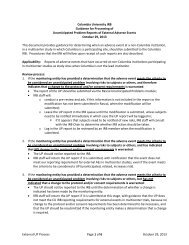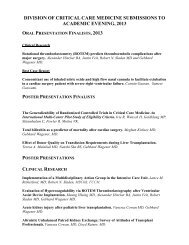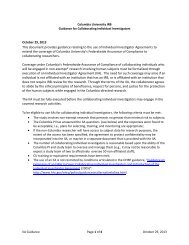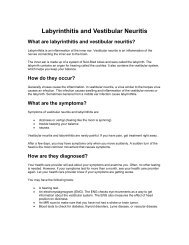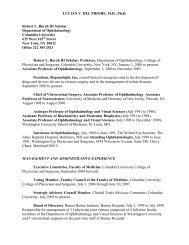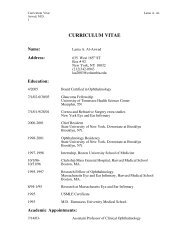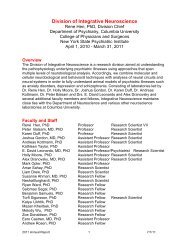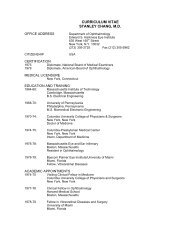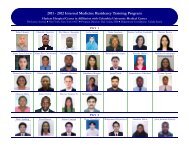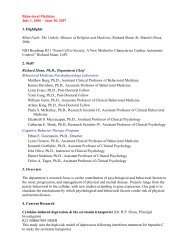2 - Columbia University Medical Center
2 - Columbia University Medical Center
2 - Columbia University Medical Center
Create successful ePaper yourself
Turn your PDF publications into a flip-book with our unique Google optimized e-Paper software.
In This Issue<br />
2..... Message from the<br />
Chairman & Director<br />
Jeffrey A. Lieberman, MD<br />
3..... Awards & Recognitions &<br />
New Division<br />
4..... New Appointments &<br />
New Clinical Location<br />
5..... Clinical News<br />
6-7..Development &<br />
Special Events<br />
8-9..Research News &<br />
New Grants<br />
10... Education & Alumni News<br />
11... Research Studies<br />
12... In Memoriam &<br />
Departmental Reading List<br />
InPysch Editorial Office:<br />
Leigh Ann Brienza, David Hellerstein,<br />
Dacia Morris, Ray Smith,<br />
Eve Vagg, Rachel Yarmolinsky<br />
Questions or comments to<br />
yarmoli@nyspi.columbia.edu<br />
<strong>Columbia</strong> <strong>University</strong><br />
Department of Psychiatry<br />
1New York State<br />
Psychiatric 1 Institute<br />
InPsych<br />
Fall, 2012<br />
Global Mental Health: An Idea Whose Time Has Come<br />
There is nothing more<br />
powerful than an idea<br />
whose time has come,<br />
said Victor Hugo.<br />
According to Dr. Kathleen<br />
Pike, Executive Director<br />
and Scientific Co-Director<br />
of the Global Mental<br />
Health Program (GMHP)@<br />
<strong>Columbia</strong>, making mental health<br />
an essential and integrated<br />
component of the global health<br />
agenda is such an idea. “We<br />
now have good research that<br />
clearly documents the profound<br />
impact that mental illness has<br />
on the global burden of disease.<br />
We also know there is an abyss<br />
between need and capacity, and<br />
it is urgent that we garner the<br />
resources to advance research,<br />
training, education, policy and<br />
outreach focused on mental<br />
health globally. Making mental<br />
health matter will save millions<br />
of lives and transform the<br />
quality of life for hundreds of<br />
millions more.”<br />
And this is where <strong>Columbia</strong><br />
<strong>University</strong> Department of<br />
Psychiatry comes in.<br />
“Fast-Fail” Initiative Takes Aim at Psychosis<br />
As pharma retreats from developing new drugs for<br />
mental disorders, a new <strong>Columbia</strong>/New York State<br />
Psychiatric Institute (NYSPI) initiative is stepping<br />
in to fill this gap.<br />
With pharma’s interest in developing drugs for<br />
mental disorders waning, CUMC and NYSPI<br />
researchers are initiating a new “fast-fail” strategy<br />
to identify novel treatments for psychosis.<br />
The word “fail” in the strategy may sound odd.<br />
But the approach is designed to quickly weed<br />
out ineffective compounds at an earlier stage in<br />
clinical testing before much money and time have<br />
been spent and, at the same time, quickly identify<br />
compounds with more potential.<br />
“The knowledge we’ve gained about psychosis in<br />
the last decade, combined with new technology, is<br />
now making it possible to determine earlier than<br />
before if new compounds have potential,” says<br />
Jeffrey Lieberman MD, chairman of Psychiatry<br />
As Dr. Pike notes,<br />
<strong>Columbia</strong> Psychiatry<br />
has experts leading<br />
important initiatives<br />
that advance mental<br />
health around the<br />
globe. By establishing<br />
the GMHP@<strong>Columbia</strong>,<br />
Dr. Pike believes<br />
we have the opportunity to<br />
expand our reach by creating a<br />
platform that takes advantage<br />
of synergistic and intersecting<br />
efforts so that we are positioned<br />
to make an even greater impact.<br />
Dr. Pike returned to <strong>Columbia</strong><br />
in 2011 after nearly 12 years in<br />
Japan where she continued her<br />
(continued on page 5)<br />
New Experimental Medicine Studies:<br />
Fast-Fail Trials in Psychotic Spectrum Disorders (FAST-PS)<br />
at <strong>Columbia</strong> and director of the New York State<br />
Psychiatric Institute, who will lead the new initiative<br />
funded by the National Institute of Mental Health.<br />
For all diseases, the development of new drugs<br />
is a story of thousands of failures and only a few<br />
successes. Of the compounds that enter phase I<br />
testing, only a small percentage are eventually<br />
approved by the FDA. For psychiatric and nervous<br />
system disorders, the success rate is even lower<br />
and compounds tend to fail late in development<br />
after hundreds of millions of dollars have already<br />
been spent.<br />
“Progress has varied across different disease<br />
areas, but psychiatric disorders pose additional<br />
obstacles,” Lieberman says. “The disturbances are<br />
uniquely human and that makes animal models<br />
harder to develop and difficult to validate. You<br />
can create heart disease in an animal, but for<br />
schizophrenia or depression, it’s much harder.”<br />
(continued on page 2)
2<br />
Global weather<br />
patterns had a<br />
local impact a<br />
few weeks ago as<br />
Hurricane Sandy<br />
traveled up the<br />
eastern seaboard of the United States. The<br />
record-breaking storm surges resulted<br />
in unprecedented damage along the<br />
low lying and densely populated coastal<br />
neighborhoods in our tri-state area, and<br />
high winds damaged homes and led to<br />
weeks without power for many residents<br />
unaffected by flooding.<br />
<strong>Columbia</strong> and PI were very fortunate. We<br />
were fortunate to be spared the damage<br />
of storm surge flooding and the loss of<br />
essential utilities. And we are fortunate<br />
indeed in having such a dedicated and<br />
caring staff, many of whom put our<br />
patients first and found a way to come in<br />
to care for them and for the facility.<br />
The extraordinary efforts and teamwork<br />
both in the preparations for and response<br />
to the storm itself allowed us to weather<br />
the storm with very little damage to our<br />
facility, seamless care for our patients and<br />
only minor disruptions to our research<br />
and educational missions.<br />
I am enormously proud of and grateful<br />
to the many individuals who gave so<br />
generously of their time and effort and<br />
demonstrated their dedication to this<br />
institution during the hurricane.<br />
Hurricane Sandy was a humbling<br />
reminder of how global forces impact<br />
on local areas. Before the storm I had<br />
intended to focus this message on the<br />
many ways that NYSPI and <strong>Columbia</strong><br />
Psychiatry make a global impact from<br />
our base in New York City and New York<br />
State. In reading through this issue I am<br />
particularly struck by how our efforts to<br />
help relieve the burdens of mental health<br />
in many countries around the world<br />
inform and enrich our efforts on behalf<br />
of our local constituencies in our city and<br />
state, and around our nation.<br />
One such effort is the Global Mental<br />
Health Program @ <strong>Columbia</strong> which, after<br />
years of planning, has become a reality<br />
under the leadership of Executive Director<br />
Message from the Chairman & Director<br />
Jeffrey A. Lieberman, MD<br />
Back to Main Page<br />
The Intersection of Local and Global “Fast-Fail” Initiative Takes Aim at<br />
and Scientific Co-Director Kathleen Pike,<br />
PhD, who rejoined our faculty last year<br />
after nearly 12 years abroad (cover story).<br />
Another very special mission was carried<br />
out by Katherine Shear, PhD, and her<br />
team, who were invited to Japan to give<br />
workshops to mental health providers<br />
on coping with the terrible grief brought<br />
about by the devastating loss of life<br />
following the earthquake and tsunami of<br />
March, 2011 (page 9). The latest addition<br />
to the many international commissions on<br />
which our faculty serve, is the invitation<br />
to Heino Meyer-Balburg, Dr.rer.nat., to<br />
serve on the Scientific Advisory Board<br />
for DSD-Life, an international registry<br />
for intersexuality funded by the European<br />
Union (page 2). Our Resident’s Corner<br />
highlights Ye Beverly Du, MD, MPH,<br />
a fourth year resident at PI, whose<br />
compelling story and concentration on<br />
global mental health began with her<br />
immigration to the United States from<br />
China at the age of five.<br />
<strong>Columbia</strong> Psychiatry and NYSPI are deeply<br />
imbedded in NY City and State, our care<br />
for our community is evident in projects<br />
such as the Promise Program (page 5)<br />
and new research from Dev Devanand,<br />
MD with significant findings for those<br />
suffering from Alzheimer’s (page 8). But<br />
even as research and programs such as<br />
these give us the knowledge and tools to<br />
reach out to the global community, so too<br />
will the lessons learned in communities<br />
around the world contribute to the<br />
wealth of knowledge and experience that<br />
<strong>Columbia</strong> Psychiatry and NYSPI bring to<br />
bear on reducing the burdens of mental<br />
illness internationally and at home.<br />
Psychosis (continued from cover)<br />
That’s left few options for people with<br />
schizophrenia. All drugs for schizophrenia – from<br />
haloperidol in the 1960s to today’s clozapine<br />
– act on the same target, the brain’s dopamine<br />
pathways. The drugs don’t work for everyone.<br />
And when they do work, they only act on some of<br />
the disorder’s disabling symptoms.<br />
The new initiative at <strong>Columbia</strong> will take aim at<br />
other brain systems and new molecular regions<br />
that are important in schizophrenia but have never<br />
been successfully targeted. The glutamate system<br />
in the brain, for example, has been associated<br />
not only with schizophrenia’s hallucinatory and<br />
delusional symptoms, but also with the disorder’s<br />
impact on cognition.<br />
New technology now makes it possible to rapidly<br />
determine if a drug candidate affects the glutamate<br />
system and binds to targets. “In traditional trials,<br />
we often didn’t even know if the drug was hitting<br />
the target,” Lieberman says. “We now have an<br />
array of imaging techniques that can determine<br />
if the compound gets into the brain in the right<br />
amount, activates the right parts of the brain, and<br />
has an effect on symptoms.”<br />
Ultimately the idea is to find early proof that a<br />
compound – or a similar molecule – could work<br />
and then submit the compounds to pharma. “It’s a<br />
new paradigm for drug development,” Lieberman<br />
says, “one that we hope will identify new<br />
promising compounds so pharma companies can<br />
be more confident taking them forward.”<br />
For more information about the initiative,<br />
including collaborating institutions, click here<br />
[http://columbiapsychiatry.org/news/new-initiativedeveloping-novel-treatments-psychosis-and-other-mental-<br />
disorders]<br />
Find us on Facebook, Follow us on Twitter<br />
Facebook.com/<strong>Columbia</strong>Psychiatry<br />
Twitter.com/<strong>Columbia</strong>Psych<br />
- Susan Conova<br />
To find out more about participating in research, please call our research referral line at<br />
212-305-6001 or visit us on the web at <strong>Columbia</strong>Psychiatry.org.<br />
www.columbiapsychiatry.org
Awards&Recognitions Back to Main Page<br />
Heino Meyer-Bahlburg, Dr.<br />
rer.nat (Gender, Sexuality<br />
and Health) was invited to<br />
serve on the international<br />
Scientific Advisory Board<br />
of DSD-Life, a major<br />
interdisciplinary registry<br />
and outcome project on patients age 16-<br />
30 years with somatic disorders of sex<br />
development (also known as intersexuality),<br />
in 6 European countries, funded by the<br />
European Union. In that role he attended the<br />
start-up meeting in Berlin, Germany, October<br />
17-19, 2012.<br />
Deborah Cabaniss, MD,<br />
(Graduate <strong>Medical</strong> Education)<br />
was appointed Director of the<br />
Virginia Apgar Academy at<br />
P&S in January 2012. Named<br />
for a renowned maternal<br />
fetal medicine pioneer, who<br />
developed the APGAR test to<br />
assess the health of newborns, the Academy<br />
will recognize teaching excellence among<br />
P&S faculty.<br />
This year’s Physician of<br />
the Year award was given<br />
to Lourdes Dominguez,<br />
MD, Chief of Service for<br />
Psychiatry at Allen Hospital.<br />
The award is given by the<br />
nursing department of the<br />
hospital. Dr. Dominguez is only the second<br />
psychiatrist to receive this honor.<br />
33<br />
In September, The American<br />
Academy of Cerebral Palsy<br />
and Developmental Medicine<br />
named Kathleen Friel, PhD<br />
(Experimental Therapeutics),<br />
their 2012 recipient of the<br />
Gayle G. Arnold Award for her<br />
work in an animal model of cerebral palsy. In<br />
her animal work, she is testing the efficacy of<br />
motor skill training in helping restore motor<br />
function and brain-spinal cord connections.<br />
Mindy Fullilove, MD,<br />
(Social Psychiatry) received<br />
the great honor of being<br />
elected a public member of<br />
the Board of Directors of<br />
the American Institute of<br />
Architects. The distinction<br />
is largely based on her research and her<br />
book on the traumatic stress endured after<br />
the loss of one’s “emotional ecosystem.” Her<br />
book is called Root Shock. Her term starts in<br />
December, 2012.<br />
In appreciation of her integral<br />
role in shaping new initiatives<br />
in Faculty Affairs, Abby Fyer,<br />
MD, (Clinical Therapeutics)<br />
has assumed the title,<br />
Associate Director for Faculty<br />
Development. She will continue her research<br />
activities, the focus of which is familial<br />
and genetic aspects of anxiety disorders,<br />
including panic disorder, social and specific<br />
phobia.<br />
The Division of HIV is now The Division of Gender, Sexuality, and Health<br />
(…and the HIV <strong>Center</strong> Remains the HIV <strong>Center</strong>)<br />
The Division of HIV at NYSPI, a longtime global leader in behavioral<br />
research into the causes and consequences of HIV infection, has<br />
always included a focus on gender, sexuality, and mental health. As<br />
its scope broadens still further in these areas, it has embraced this<br />
expansion with a reframed mission and a new identity.<br />
Leadership at the newly named Division of Gender, Sexuality, and<br />
Health will continue under the outstanding direction of Director Anke<br />
Ehrhardt, PhD, who notes that, “The HIV <strong>Center</strong> for Clinical and<br />
Behavioral Studies will remain a key element of the Division, and<br />
HIV studies will remain a critical component of the Division. The<br />
expansion and reframing of the Division of Gender, Sexuality, and<br />
Health provides an opportunity for NYSPI and <strong>Columbia</strong> Psychiatry<br />
to take a major new step into an arena of health promotion in the<br />
context of gender and sexuality that includes the HIV epidemic but<br />
also extends far beyond.”<br />
The reframed Division will launch several important new programs,<br />
including a major “Initiative for LGBT Health” that comprises re-<br />
search, clinical<br />
care, education,<br />
and policy as related<br />
to the physical<br />
and mental health<br />
needs of the lesbian,<br />
gay, bisexual,<br />
and transgender<br />
(LGBT) population.<br />
Dr. Walter Bockting<br />
recently joined<br />
the Division as Co-<br />
Director of the Initiative (see New Faculty).<br />
David Kahn, MD has been<br />
appointed the Diane Goldman<br />
Kemper Family Professor of<br />
Psychiatry in recognition of<br />
his outstanding performance<br />
as a clinician and teacher,<br />
particularly in the area of<br />
mood disorders.<br />
Frances Levin, MD (Substance<br />
Abuse) was recognized for<br />
Honorable Mention in the first<br />
ever Mentor of the Year Award<br />
at CUMC, sponsored by the<br />
Irving Institute in collaboration<br />
with The CUMC Office of Academic Affairs.<br />
The award recognizes the tremendous<br />
support given to young faculty academically,<br />
clinically, professionally and personally.<br />
Alice Medalia, PhD, is a<br />
recipient of the Brain & Behavior<br />
Research Foundation’s 5th<br />
annual Productive Lives<br />
Award. The Brain & Behavior<br />
Research Foundation proudly<br />
recognizes remarkable human<br />
beings who have risen to the top of their<br />
respective professions and who have devoted<br />
their energy and formidable talents to helping<br />
those living with mental illness.<br />
Dr. Medalia is an international leader in the<br />
field of psychiatric rehabilitation who directs<br />
the Lieber Recovery Clinic at <strong>Columbia</strong><br />
Psychiatry.<br />
Dr. Jeffrey Lieberman announcing the establishment of the Division of Gender,<br />
Sexuality, and Health at the Department of Psychiatry 2012 Annual Meeting<br />
The Division of Gender, Sexuality, and Health will also serve as a<br />
much-needed coordinating mechanism for all <strong>Columbia</strong> Psychiatry<br />
faculty engaged with the study of gender and sexuality, while providing<br />
critically needed training support to residents, graduate students,<br />
postdoctoral fellows, professional staff, and community members.<br />
www.columbiapsychiatry.org
NewAppointments<br />
Walter Bockting, PhD<br />
Walter Bockting, PhD, has been nominated Professor<br />
of <strong>Medical</strong> Psychology (in Psychiatry and Nursing)<br />
at <strong>Columbia</strong> <strong>University</strong> College of Physicians and<br />
Surgeons and The School of Nursing. A native of the<br />
Netherlands, Dr. Bockting is a clinical psychologist and<br />
an internationally known sexuality researcher. Among<br />
his many accomplishments, he was the first to assess and address<br />
the HIV prevention needs of the transgender community, developing<br />
a model HIV prevention workshop; to affirm a spectrum of gender<br />
diversity in the delivery of transgender care; and to conduct a national<br />
study of the U.S. transgender population.<br />
In October, 2012, Dr. Bockting joined the Department of Psychiatry<br />
and the New York State Psychiatric Institute (NYSPI) in the Division of<br />
Gender, Sexuality, and Health as Co-director (with Dr. Anke Ehrhardt)<br />
of the Division’s new Initiative for LGBT Health, which is being carried<br />
out in close collaboration with the School of Nursing. The Initiative<br />
focuses on research, clinical care, education, and public policy analysis<br />
with regard to the health of lesbian, gay, bisexual, and transgender<br />
populations.<br />
Dr. Bockting received his doctoral degree in psychology from the<br />
Vrije Universiteit, Amsterdam, The Netherlands, and for the last 20<br />
years directed transgender health services at the Program in Human<br />
Sexuality at the <strong>University</strong> of Minnesota.<br />
Amy Friedman, MS, RD<br />
Amy Friedman, MS, RD, joined the department as<br />
Director of Clinical Services Administration on<br />
October 15, 2012.<br />
She comes to us from NewYork-Presbyterian Hospital<br />
where she spent the past seven years, most recently<br />
as the Practice Administrator for Pediatric Psychiatry.<br />
She received a Master’s of Science degree in Nutrition and Food<br />
Science from the <strong>University</strong> of Vermont, and her Bachelor of Science<br />
degree from Plattsburgh State <strong>University</strong>.<br />
In her new position, Ms. Friedman will oversee the administrative and<br />
supervisory matters pertaining to all facets of the <strong>Columbia</strong> psychiatry<br />
clinical services, including our department-based clinical and practice<br />
management operations. She will be the operational point person<br />
NewClinicalLocation<br />
We are eagerly anticipating the January 2013<br />
opening of the new <strong>Columbia</strong>Doctors<br />
Faculty Practice <strong>Center</strong> at 51 West 51st<br />
Street near Rockefeller <strong>Center</strong> in midtown<br />
Manhattan. <strong>Columbia</strong> Psychiatry programs<br />
from 15 East 60th Street will relocate to 51 W<br />
51, settling into an attractive and expanded<br />
suite with views overlooking 51st street.<br />
The Psychiatry programs relocating include<br />
the Lieber Recovery Clinic and the Day<br />
Treatment Program; please click here for<br />
more information on all our clinical programs<br />
moving to 51W51 (http://columbiapsychiatry.org/<br />
clinicalservices/day-program-eastside)<br />
New St <strong>Columbia</strong>Doctors entrance at 51W51<br />
Back to Main Page<br />
to the <strong>Columbia</strong> Doctors faculty practice organization, and will be a<br />
liaison to our hospital-based practices within NewYork-Presbyterian<br />
Hospital.<br />
Avalon Lance, BSN, MHA<br />
On September 1, 2012 Avalon Lance, BSN, MHA,<br />
assumed her new role as the Vice Chair for<br />
Administration and Finance. She was appointed<br />
after an extensive search process and received the<br />
endorsement of the New York State Office of Mental<br />
Health and the approval of <strong>Columbia</strong> and RFMH<br />
leadership. In her new capacity, Ms. Lance will oversee the finance<br />
and business administration of the <strong>Columbia</strong> <strong>University</strong> Department<br />
of Psychiatry, RFMH at NYSPI, and the psychiatric services of NYPH-<br />
CUMC.<br />
She received a Bachelor of Science in Nursing degree from Seattle<br />
Pacific <strong>University</strong> and a Masters in Healthcare Administration from the<br />
<strong>University</strong> of Minnesota. She has worked in health care administration<br />
in various capacities including most recently 11 years at the <strong>University</strong><br />
of Washington School of Medicine, primarily as Director of Finance<br />
and Administration for the Department of Surgery. Prior to her new<br />
appointment, Ms. Lance served as the Interim <strong>Columbia</strong> <strong>University</strong><br />
Department Administrator.<br />
Stephanie LeMelle, MD<br />
Dr. Stephanie Le Melle has joined the core faculty of<br />
the Public Psychiatry Fellowship. Dr. LeMelle is the<br />
first new core faculty member since 1994, and the<br />
first graduate of the Public Psychiatry Fellowship to<br />
join the core faculty.<br />
Dr. LeMelle will collaborate with Fellowship Director Jules Ranz, MD,<br />
on the development of the Program for Public Psychiatry Education<br />
(PPE). PPE’s mission is to promote the principles and practices of<br />
public psychiatry education in psychiatry residency training programs<br />
here at <strong>Columbia</strong>, throughout New York City, and nationally.<br />
Dr. LeMelle was the Associate Director of the Washington Heights<br />
Community Service, the clinical community program at New York<br />
State Psychiatric Institute, for 10 years. She held the title of Clinical<br />
Director of New York State Psychiatric Institute for 3 years and is an<br />
Associate Clinical Professor of Psychiatry at <strong>Columbia</strong> <strong>University</strong>.<br />
Floorplan of the new <strong>Columbia</strong> Doctors<br />
Practice (<strong>Columbia</strong> Psychiatry Day<br />
Treatment Program offices circled)<br />
4 www.columbiapsychiatry.org
ClinicalNews<br />
work on risk factors for eating disorders,<br />
training and dissemination of evidencebased<br />
treatments, and community efforts to<br />
increase capacity and reduce the stigma of<br />
mental illness. Since her return to <strong>Columbia</strong>,<br />
she has been working with colleagues in the<br />
department to propel a global mental health<br />
agenda forward.<br />
of evidence-based psychotherapies, Drs.<br />
Sandro Galea and Ezra Susser in the area of<br />
severe mental illness, and others. Dr. Pike<br />
is working with a curriculum development<br />
team, including Drs. Fran Cournos, Claude<br />
Mellins, Richard Neugebauer, Lena Verdeli,<br />
and Milton Wainberg to establish a graduate<br />
level program in global mental health. Dr.<br />
Pike notes as well that Drs. Milton Wainberg<br />
and Maria Oquendo are PIs on a T32 Training<br />
Grant in Global Mental Health.<br />
Back to Main Page<br />
Program Lives Up To Its Promise In Providing Care To Low-Income Children<br />
With Learning Disabilities<br />
Limited resources and lack of knowledge<br />
about their rights as parents are two<br />
fundamental deterrents to accessing<br />
treatment for learning disabled children,<br />
noted Molly Algermissen, PhD. Dr.<br />
Algermissen is Clinical Director of The<br />
Promise Program, developed to provide<br />
low-income families with comprehensive,<br />
state-of-the-art neuropsychological<br />
evaluations that otherwise would be<br />
unobtainable for this population.<br />
The program in the Division of Child<br />
and Adolescent Psychiatry at <strong>Columbia</strong><br />
<strong>University</strong> <strong>Medical</strong> <strong>Center</strong> (CUMC) and NewYork-Presbyterian/<br />
Morgan Stanley Children’s Hospital, provides an educational path for<br />
underserved children who struggle with learning disabilities.<br />
Global Mental Health: An Idea Whose Time Has Come (continued from cover)<br />
Untreated learning disabilities (LD),<br />
which affect 1 in 10 school-age<br />
children, significantly interfere with<br />
a child’s ability to learn and achieve<br />
in school. This can have a pervasive<br />
impact on many areas of functioning,<br />
and is associated with high rates of<br />
school drop out, unemployment,<br />
poor self esteem, and secondary<br />
psychiatric difficulties including<br />
behavioral problems, depression,<br />
anxiety and substance abuse.<br />
Clinicians are hoping to change this<br />
fate with the Promise Program.<br />
Early intervention is important, said Dr. Algermissen, “especially in<br />
those early key academic years – 1st, 2nd and 3rd grades. These are<br />
(continued on page 12)<br />
“But I think the opportunity for global mental<br />
health is to articulate effectively that, in fact,<br />
by integrating mental health when addressing<br />
these other priorities, outcomes across the<br />
board will be better.“<br />
Dr. Pike has established a scientific<br />
leadership team, including Drs. Harold<br />
Pincus, Sandro Galea and Ezra Susser,<br />
and a steering committee that includes<br />
colleagues from psychiatry, psychology,<br />
public health, nursing, social work, and the<br />
Earth Institute. The multidisciplinary initiative<br />
reflects the range and complexity of global<br />
mental health priorities, and is consistent<br />
with President Bollinger’s commitment to<br />
building connections across departments<br />
and programs in the service of creating<br />
comprehensive strategies and solutions that<br />
address the complex problems of the 21st<br />
century.<br />
The program brings together experts who are<br />
inarguably pioneers in their fields, including<br />
Dr. Anke Ehrhardt, in the area of HIV, Dr.<br />
Myrna Weissman in the area of depression,<br />
Dr. Christine Hoven in child mental health, Dr.<br />
Nabila elBassel in the area of substance use<br />
disorders, Dr. Lena Verdeli in the dissemination<br />
Dr. Pike continues to conduct research and<br />
clinical training in the area of eating disorders,<br />
problems that consistently increase in<br />
prevalence, along with obesity, in the context<br />
of emerging economies. In addition, in<br />
partnership with a group called Outside the<br />
Wire, she is actively engaged in developing<br />
community-based interventions that use<br />
theater and other media to reduce stigma<br />
of mental illness and increase community<br />
capacity to support and serve those with<br />
mental illness. (See Dr. Pike speaking on<br />
stigma and mental illness on TEDxTOKYO)<br />
“There are profound and varied needs in<br />
many low and middle income communities<br />
(LMICs) that run the gamut from housing to<br />
employment to food supply and health care,<br />
so it’s understandable that adding mental<br />
health to the global heath agenda is often<br />
seen as a competing priority,” said Dr. Pike.<br />
One of the exciting opportunities on the horizon<br />
for the GMHP@<strong>Columbia</strong> is a partnership<br />
with the World Health Organization (WHO).<br />
The WHO is working on the revision of the<br />
10th edition of the International Classification<br />
of Diseases (ICD), the standard diagnostic<br />
system for mental disorders used around<br />
the globe. The GMHP@<strong>Columbia</strong> has been<br />
invited to serve as the research design and<br />
methodology center for the clinical field<br />
trials for the ICD-10. Dr. Pike is working with<br />
colleagues at the WHO to set up a center that<br />
will establish an academy of faculty from<br />
<strong>Columbia</strong> and from around the globe who<br />
will be responsible for the clinical field trials<br />
for the ICD. “The opportunity is not only to<br />
contribute to the historic work of the WHO<br />
on the ICD revisions but also to establish<br />
an enduring research consortium that will<br />
have the infrastructure to support ongoing<br />
research collaborations and capacity building<br />
in global mental health.”<br />
Employees engaged in global mental health<br />
activities who would like to get involved in<br />
GMPH@<strong>Columbia</strong> should contact Dr. Pike at<br />
kmp2@columbia.edu.<br />
5 www.columbiapsychiatry.org
Development&SpecialEvents<br />
6<br />
Back to Main Page<br />
Hamptons Cocktail Reception Raises Awareness of Women’s Mental Health Needs<br />
On August 11th, Berthold and Betsy Frowein hosted a reception at<br />
their East Hampton home to support the Women’s Program in the<br />
Department of Psychiatry. Over fifty guests gathered at the beautiful<br />
Frowein estate to converse with <strong>Columbia</strong> Psychiatry faculty,<br />
including Dr. Jeffrey Lieberman, Dr. Fred Kass, and the Director of<br />
the Women’s Program, Dr. Betsy Fitelson. The Women’s Program is<br />
devoted to addressing the mental health needs of women related to<br />
the female reproductive life cycle.<br />
Dr. Frederic Kass<br />
Dinner Celebrates New Professorship at <strong>Columbia</strong> Psychiatry<br />
On October 25th, a dinner held at The Modern celebrated the establishment of the<br />
Diane Goldman Kemper Family Professorship of Psychiatry and the appointment of<br />
its first incumbent, David Kahn, MD. This event was co-hosted by Dean Lee Goldman,<br />
MD, and <strong>Columbia</strong> Psychiatry Chairman,<br />
Jeffrey A. Lieberman, MD, and highlighted<br />
the wonderful accomplishments of Dr.<br />
Kahn as well as the philanthropy of Ms.<br />
Diane Goldman Kemper in endowing<br />
Dr. Jeffrey Lieberman, Dr. David Kahn<br />
this professorship. During the dinner,<br />
Dean Goldman presented both Dr. Kahn and Ms. Goldman Kemper with medallions<br />
to commemorate their extraordinary contributions to <strong>Columbia</strong> <strong>University</strong> <strong>Medical</strong><br />
<strong>Center</strong>’s mission.<br />
Myrna Daniels, Dr. Jeffrey Lieberman, John Daniels<br />
Dr. Lee Goldman, Dr. David Kahn, Diane Goldman Kemper<br />
Berthold Frowein, Liz Lange, Betsy Frowein, Dr. Jeffrey Lieberman<br />
The Women’s Program Faculty: Dr. Lucy Hutner,<br />
Dr. Catherine Monk, Dr. John Sahs, Dr. Betsy Fitelson<br />
The Chairman’s Frontier Fund is the annual fund of <strong>Columbia</strong> Psychiatry, and provides critical support for<br />
our core mission. The name is inspired by the brain itself – one of the last true frontiers of exploration and<br />
discovery, and the focus of our vital research at <strong>Columbia</strong> Psychiatry. The Chairman’s Frontier Fund helps<br />
support new initiatives, as well as ongoing projects that have a direct impact on the quality of the education,<br />
research, and services <strong>Columbia</strong> Psychiatry can provide.<br />
<strong>Columbia</strong> Psychiatry is proud to be an international leader in the field of psychiatric medicine, and gifts to the<br />
Chairman’s Frontier Fund make a significant difference in our work. We are extremely grateful to our dedicated supporters for their generosity.<br />
To learn more about the Chairman’s Frontier Fund or to make a gift, please contact Leigh Ann Brienza, Director of Development, at (212) 304-7227 or<br />
lab2213@columbia.edu.<br />
Thank you for your support of <strong>Columbia</strong> Psychiatry!<br />
www.columbiapsychiatry.org
Development&SpecialEvents<br />
Sander Markx, MD, Receives The Pisetsky Award<br />
Dr. Lieberman, Dr. Oquendo, and past recipients of the Pisetsky Award attended the luncheon to thank Dr. Bender and<br />
congratulate Dr. Markx. (Pictured left to right: Dr. Scott Schobel, Dr. Carolyn Rodriguez, Dr. Estelle Bender, Dr. Cheryl Corcoran,<br />
Dr. Sander Markx, Dr. Maria Oquendo, Dr. Jeffrey Lieberman)<br />
An Italian Feast Supports Research On Brain Trauma And Stress Disorders<br />
On October 22nd, the celebrated Italian<br />
restaurant Sistina in New York’s Upper East<br />
Side served as the backdrop to a fundraising<br />
dinner to support brain trauma and stress<br />
disorders in US military veterans. Sistina<br />
owner Giuseppe Bruno generously offered<br />
to host the event in the hopes that it would<br />
raise greater awareness of this serious<br />
consequence of military combat. He cohosted<br />
the dinner with Ambassador Paul W.<br />
Speltz, who for four years represented the US<br />
as the Executive Director and Ambassador to<br />
the Asian Development Bank.<br />
“Our veterans deserve our support and<br />
admiration for their selfless dedication,”<br />
said Dr. Jeffrey Lieberman. “In view of the<br />
devastating effects that brain injury and<br />
PTSD are having on our soldiers, we must<br />
redouble our efforts to better diagnose<br />
and treat these debilitating conditions. The<br />
physicians and scientists at CUMC pledge to<br />
do so and appreciate the support of citizens<br />
like Giuseppe Bruno and Ambassador<br />
Speltz.”<br />
77<br />
Ambassador Paul W. Speltz, Dr. Sidney LaPook,<br />
Giuseppe Bruno, Dr. Jeffrey Lieberman<br />
Dr. Scott Small, Sergeant Ryan Weemer,<br />
Sergeant Matt Colvin, Colonel David Sutherland,<br />
Dr. Jeffrey Lieberman, Ambassador Paul W. Speltz<br />
Colonel David Sutherland<br />
Back to Main Page<br />
Sander Markx, MD, received the<br />
2012 Pisetsky Award and was<br />
honored on July 19th at a luncheon<br />
attended by the award’s founder<br />
and benefactor, Estelle Bender,<br />
MD (P&S ’68), and past recipients<br />
of the prize. The Pisetsky Award<br />
supports young investigators<br />
conducting pilot clinical research<br />
in serious mental illness in adults<br />
including psychotic disorders,<br />
mood disorders, eating disorders,<br />
and obsessive-compulsive disorder.<br />
E. John Rosenwald Jr., Pat Rosenwald,<br />
Dr. Jeffrey Lieberman, Rosemarie Lieberman<br />
Marianne Mebane, John Yarosz, Jane Rice<br />
Bill Ramonas, Pat Ramonas, Steve Rosenfeld Dr. Jeffrey Lieberman, Dr. Ronni Lee Seltzer,<br />
Dr. Harold Selman<br />
www.columbiapsychiatry.org
ResearchNews<br />
NewGrants<br />
8<br />
Discontinuation of Antipsychotic Treatment Poses Significant Risk of<br />
Relapse in Alzheimer’s Patients with Psychosis or Agitation<br />
Discontinuing antipsychotic treatment is associated<br />
with a high risk for relapse in Alzheimer’s disease<br />
patients with psychosis or agitation or aggression,<br />
according to a new study in the October 18th issue<br />
of the New England Journal of Medicine. After<br />
clinical response to the antipsychotic medication<br />
risperidone, there was an increased risk of<br />
recurrence (relapse) of patients’ problematic<br />
symptoms of psychosis or agitation-aggression<br />
after risperidone was discontinued in patients who<br />
had maintained improvement for 4 to 8 months.<br />
Millions of older Americans suffer from Alzheimer’s<br />
disease and during the course of illness a large<br />
proportion develop psychosis and agitation or<br />
aggression. These symptoms make them difficult<br />
to manage at home and often lead to nursing home<br />
admission and increase their risk of dying from the<br />
disease. These symptoms are often treated with<br />
antipsychotic medications. In nursing homes,<br />
federal regulations strongly urge discontinuation<br />
of antipsychotic medications three to six months<br />
after initiating treatment. Until now evidence<br />
from controlled studies in support of these longstanding<br />
regulations has been very limited.<br />
DP Devanand, MD, lead study author and Director<br />
of the Division of Geriatric Psychiatry, conducted<br />
a study across 8 US centers to evaluate the risk<br />
of recurrence of symptoms after discontinuation<br />
of the antipsychotic medication risperidone<br />
in outpatients and nursing home patients<br />
with Alzheimer’s disease whose symptoms of<br />
psychosis or agitation-aggression had responded<br />
to treatment with risperidone.<br />
The study recruited 180 patients ranging in age<br />
from 50 to 95 years from memory clinics and<br />
nursing homes as well as from Veterans Affairs<br />
medical centers and physicians’ offices. These<br />
patients received risperidone for 16 weeks in the<br />
first phase of the study. In the second phase, 110<br />
patients who had responded to risperidone were<br />
randomly assigned in a double-blind fashion<br />
(neither the patient nor the doctor knew if the<br />
treatment was risperidone or placebo) to one of<br />
three treatment groups: (1) continued treatment<br />
with risperidone for 32 weeks, (2) risperidone for<br />
16 weeks followed by placebo for 16 weeks or (3)<br />
placebo for 32 weeks.<br />
In the first 16 weeks after randomization, patients<br />
switched from risperidone to placebo showed<br />
nearly double the risk of relapse compared to<br />
continuation risperidone (60% versus 33%). In<br />
the second 16 weeks after randomization, 48% of<br />
patients who were switched from risperidone to<br />
placebo relapsed compared to 15% of those who<br />
continued risperidone. Serious adverse events did<br />
not differ significantly among the groups.<br />
Back to Main Page<br />
Dr. Devanand noted that “A meta-analysis of<br />
studies has linked the use of antipsychotics to an<br />
increased risk of death which is 1.6 to 1.7 times<br />
greater with antipsychotics compared to placebo,<br />
a finding that led the FDA to issue a black box<br />
warning several years ago. However, antipsychotic<br />
medications are the only group of drugs previously<br />
shown to be more effective than placebo, although<br />
with low-to-moderate efficacy, in treating these<br />
problematic symptoms in patients with Alzheimer’s<br />
disease. Antipsychotics are not approved by the<br />
FDA for this purpose,” said Dr. Devanand. “This<br />
risperidone discontinuation trial used a study<br />
design consistent with clinical practice: treating<br />
with medication and then either continuing or<br />
discontinuing the medication in patients who had<br />
maintained improvement over an extended period<br />
of time. The findings show a significantly increased<br />
risk of relapse after antipsychotic discontinuation in<br />
patients who respond to the antipsychotic, and this<br />
increased risk of worsening in symptoms needs to<br />
be weighed against the risk of adverse effects with<br />
continued antipsychotic treatment. These findings<br />
also provide new scientific evidence to help inform<br />
current regulations that govern clinical practice,<br />
which may need reconsideration.”<br />
Janssen Pharmaceuticals provided the active drug<br />
medication as well as placebo for this research<br />
study but was otherwise uninvolved in the<br />
research. The authors report financial activities<br />
with other pharmaceutical companies unrelated to<br />
this research.<br />
Funding for the study was provided by the National Institutes of Health (R01 AG021488 and R01 AG17761) and the Department of Veterans Affairs.<br />
An R21 was awarded to Jimmy Choi,<br />
PsyD (Cognitive Neuroscience) to<br />
fund his study, “Cognitive Training<br />
for Memory Deficits Associated with<br />
Electroconvulsive Therapy.” The twoyear<br />
grant award totals $454,522.<br />
The NIMH awarded Andrew Dwork,<br />
MD (MIND) an R01 to fund his study,<br />
“Building Schizophrenia Research<br />
in Macedonia.” The award totals<br />
$2,266,995 over five years.<br />
Deborah Hasin, PhD (Substance<br />
Abuse) received an R01 from NIDA in<br />
support of her study, “State <strong>Medical</strong><br />
Marijuana Laws and MTF Teen<br />
Marijuana Use and Attitudes Since<br />
1991.” The five-year grant comes to<br />
$2,229,089.<br />
NIDA awarded John Mariani, MD<br />
(Substance Abuse) an R01 to support<br />
his research study, “Quetiapine<br />
Pharmacotherapy for Cannabis<br />
Dependence.” The four year grant totals<br />
$1,750,365.<br />
Alice Medalia, PhD (Psychiatric<br />
Rehabilitation) was awarded an R21<br />
from NIMH to support her study,<br />
“Cognitive Skills Training to Improve<br />
Vocational Outcome in Homeless<br />
Youth.” The two-year award totals<br />
$454,628.<br />
Frederick John Muench, PhD<br />
(Substance Abuse) received a National<br />
Institute on Alcohol Abuse and<br />
Alcoholism grant in the amount of<br />
$689,139. The three-year award is to<br />
support his study, “Tailored Mobile<br />
Text Messaging to Reduce Problem<br />
Drinking.”<br />
The National Institute for Occupational<br />
Safety and Health awarded Ping Wu,<br />
PhD (Child and Adolescent Psychiatry)<br />
a two-year grant in the amount of<br />
$477,283. The title of his study is<br />
“Mental Health Service Need and Use<br />
Among Youth Exposed to the WTC<br />
Attack.”<br />
NARSAD Young Investigator Award<br />
2012 Recipients<br />
Of the more than 1,000 applications<br />
submitted to the Brain & Behavior<br />
Research Foundation Scientific<br />
Council, 202 were awarded a $60,000<br />
(continued on page 9)<br />
NARSAD grant. Below are the <strong>Columbia</strong><br />
Psychiatry investigators whose<br />
innovative research will be supported<br />
this year.<br />
Susanne E. Ahmari, MD, PhD<br />
(Integrative Neuroscience). Deep brain<br />
stimulation (DBS) shows promise for<br />
treating OCD, but optimal targets for<br />
stimulation have not been determined.<br />
Dr. Ahmari’s goal is to optimize target<br />
selection for DBS use in humans so as<br />
to maximize symptom reduction and<br />
minimize side effects.<br />
Alex Dranovsky, MD, PhD (Integrative<br />
Neuroscience). Neurons born in<br />
adulthood in the hippocampus can<br />
affect the neuroendocrine response<br />
to stress and alter behavior. Dr.<br />
www.columbiapsychiatry.org
ResearchNews<br />
99<br />
A Year After the Tsunami, Sendai, Japan Hosts Complicated Grief Experts<br />
Five years ago after attending a workshop<br />
on complicated grief in the US, a group of<br />
clinical researchers at the Japanese National<br />
Institute of Mental Health in Tokyo extended<br />
an invitation to Katherine Shear, MD to provide<br />
consultation. Four years later, the tsunami<br />
and earthquake that devastated coastal towns<br />
in northeast Japan in March 2011 tested<br />
the mettle of mental health providers there.<br />
Communities were ravaged by grief and in<br />
Sendai, Japan, where Dr. Shear and Nancy<br />
Turret, LCSW, visited in June 2012 to lead<br />
workshops, the loss was palpable.<br />
One report out of Onagawa on the impact of<br />
the disaster noted that “One cannot absorb<br />
the meaning of 1,000 dead for a town with a<br />
population of only 12-13,000 until one speaks<br />
to the survivors.” But clinicians preparing<br />
to respond to the anticipated mental health<br />
needs that would surface after other more<br />
immediate concerns were addressed had other<br />
challenges.<br />
“In addition to the stigma related to mental<br />
health problems, generally, and mental health<br />
New Grants (continued from page 8)<br />
Dranovsky will generate genetically<br />
modified animals in which adultborn<br />
hippocampal neurons do not<br />
effectively integrate into pre-existing<br />
hippocampal circuits. Through<br />
behavioral tests to model anxiety and<br />
depressive behaviors, he will compare<br />
behavior at the baseline with behavior<br />
following exposure to stress.<br />
Caline Karam, PhD (Molecular<br />
Therapeutics). Many studies<br />
support that altered presynaptic<br />
dopamine levels play a central role in<br />
schizophrenia. In an effort to uncover<br />
the signaling pathways that modulate<br />
presynaptic dopamine stores, Dr.<br />
Karam will use a genetic screen to<br />
identify novel regulators of presynaptic<br />
dopamine accumulation and release.<br />
treatment, there is also a very strong feeling<br />
in Japan, as there is in many places including<br />
here [in the US] that grief should never be<br />
considered pathology,” said Dr. Shear. In fact,<br />
discussions about adding complicated grief<br />
to the next volume of the DSM, psychiatry’s<br />
manual of mental disorders, had stirred up<br />
strong feelings among clinicians and patients<br />
on both sides of the argument in the US.<br />
Some of the symptoms of complicated grief<br />
are: persistent, intense yearning and longing<br />
and despairing sadness; preoccupation with<br />
thoughts and memories of the deceased<br />
person, to the exclusion of any other<br />
meaningful interests. While grief is a universal<br />
response to loss and mourning rituals vary,<br />
symptoms of complicated grief have been<br />
found to be remarkably consistent across<br />
cultures.<br />
Working with survivors and mental health<br />
clinicians in Japan required an acute attention<br />
to cultural values that placed the needs of the<br />
community ahead of those of the individual.<br />
Gaman (“enduring the seemingly unbearable<br />
with patience and dignity”) and Ganbaru (“a<br />
dogged persistence”) are the defining concepts<br />
in Japanese culture that probably figured more<br />
prominently in the traditional, self-contained<br />
population in Sendai.<br />
Residents’ stoicism may have helped to<br />
mask the extent of the psychological damage<br />
endured but signs of trouble soon became<br />
evident. Mental health providers in the area<br />
found growing rates of alcoholism and suicide,<br />
particularly among men. Other problems that<br />
Attila Losonczy, MD, PhD<br />
(Neuroscience). Dr. Losonczy aims<br />
to determine the activity patterns<br />
of distinct classes of hippocampal<br />
inhibitory interneuron and pyramidal<br />
cell populations in vivo during<br />
spatial behaviors and their potential<br />
alterations in animal models of<br />
schizophrenia.<br />
Caitlin McOmish, PhD<br />
(Developmental Neuroscience). Dr.<br />
McOmish’s research aims to elucidate<br />
the manner by which hallucinations,<br />
a core symptom of schizophrenia, are<br />
produced.<br />
Susana Mingote, PhD (Molecular<br />
Therapeutics). Dr. Mingote seeks<br />
to elucidate the role of glutamate<br />
co-transmission in the development<br />
of amphetamine induced behaviors,<br />
thereby revealing processes involved<br />
in the transition to addiction.<br />
Sebastien Parnaudeau, PhD<br />
(Neuroscience). Dr. Parnaudeau’s<br />
research aim is to increase<br />
understanding of the circuits involved<br />
in cognitive deficits in schizophrenia.<br />
Alexandre Saez, PhD (Neuroscience).<br />
Dr. Saez’s research will elucidate<br />
how prefrontal input can regulate the<br />
responsivity of the amygdala, a key<br />
mechanismin maintaining normal<br />
adaptive emotional responses that<br />
likely becomes dysfunctional in many<br />
patients with psychiatric disorders.<br />
Benjamin Samuels, PhD (Integrative<br />
Neuroscience). Dr. Samuels seeks to<br />
determine the mechanisms underlying<br />
the neurogenesis-dependence of the<br />
antidepressant response.<br />
Back to Main Page<br />
later emerged, pointed out Dr. Shear, were<br />
aggression/violence, problems at work,<br />
marital problems and homelessness. One of<br />
the underlying causes of these “observable<br />
problems,” is complicated grief.<br />
During the workshop, which focused on<br />
providing an overview of the framework<br />
for understanding loss and grief, defining<br />
complicated grief, and demonstrating some of<br />
the techniques used in treatment, Dr. Shear’s<br />
staff saw a gradual shift. The initial skepticism<br />
about whether the treatment could be applied<br />
to the setting diminished for the most part and<br />
participants expressed interest in learning how<br />
to deliver treatment to their communities.<br />
Currently, members of the Complicated<br />
Grief Program are providing consultation to<br />
clinicians in Japan. Future initiatives include<br />
developing a public health intervention with<br />
colleagues in Tokyo and Sendai.<br />
For those interested in learning more about<br />
complicated grief symptoms and treatment,<br />
please visit www.complicatedgrief.org.<br />
Ardesheer Talati, PhD (Clinical<br />
Therapeutics). Using functional MRI,<br />
Dr. Talati will examine the effects<br />
of smoking during pregnancy on<br />
offspring’s brain function. He will<br />
examine whether exposed offspring<br />
have different brain responses than<br />
those not exposed to smoking and if<br />
these differences explain why those<br />
exposed to smoking go on to have<br />
behavioral problems.<br />
Xiaoyan Xu, PhD (Translational<br />
Imaging). Dr. Xu’s research aims to<br />
elucidate the essential link between<br />
dopamine receptor mutations, the<br />
affected neuronal circuits in substance<br />
abuse and the corresponding learning<br />
deficits.<br />
www.columbiapsychiatry.org
EducationNews<br />
10<br />
Residents’ Corner: Ye Beverly Du, MD, MPH<br />
A trip to rural China in<br />
the summer of 2005 to<br />
study Chinese herbal<br />
medicine smacked of<br />
“indulgence” said Dr.<br />
Ye Beverly Du when<br />
she came face-to-face<br />
with the staggering<br />
poverty there and the<br />
profound degree of untreated psychiatric<br />
illness.<br />
“My parents spent a lot of time in rural<br />
China on the communes during the Cultural<br />
Revolution and they would talk about that<br />
period of time a lot,” said Dr. Du, who is in<br />
her fourth year of residency. Her going to<br />
China just after beginning medical school,<br />
she said, was her way of “chasing after these<br />
stories” she had heard growing up. It was a<br />
way to bridge the gap between her American<br />
experience and the deeply-rooted Chinese<br />
identity of her parents’ generation. “But what<br />
I found was something that was so much<br />
less romantic and really compelling in terms<br />
of the need.”<br />
Upon her return to medical school, Dr. Du’s<br />
focus became global mental health. She soon<br />
set out for Indonesia, where she interviewed<br />
displaced parents and children about how<br />
they were affected by prolonged stays in<br />
“temporary” barracks after the Tsunami in<br />
2007. She found that in Indonesia, psychiatry<br />
gained newfound prominence as the word<br />
“trauma” became a ubiquitous thread in<br />
AlumniNews<br />
1950s<br />
Class of 1959 graduate, Laurence T. Beahan,<br />
MD, published in July Inside Allegany, a two<br />
volume book on the history of Allegany<br />
State Park. He writes: “Allegany at 60,000<br />
acres is the largest Park in the NY State Park<br />
System. It is located on the Pennsylvania<br />
New York border 70 miles south of Buffalo.<br />
Working with the Sierra and Adirondack<br />
Mountain Clubs, I was active in the fight<br />
that successfully completed a Master Plan<br />
for the Park, which designates it a NY State<br />
Park Preserve and protects it from lumber<br />
and gas extraction.”<br />
discussions among NGO’s and other agency<br />
workers following the disaster. However, two<br />
years later after “funding had dried up” the<br />
story took a turn for the worse: “We found<br />
that the kids, who still lived in these places<br />
[temporary barracks] were three times as<br />
likely to report Tsunami-related fears,” Dr. Du<br />
said. “We interpreted it as a sign that these<br />
children were persistently reminded of how<br />
their families, for whatever reason, have been<br />
unable to recover from the tsunami.”<br />
But while she had decided upon a career in<br />
psychiatry in medical school, Dr. Du pursued<br />
her MPH at Harvard’s School of Public<br />
Health; she struggled with whether a public<br />
health or medical perspective would prove<br />
more effective in making a difference in the<br />
lives of people in low resource settings.<br />
“One of the reasons I went into psychiatry<br />
was that I felt that people who suffered<br />
from psychiatric problems often end up at<br />
the bottom-most rung of society in a lot of<br />
places.” She shared a story of a prominent<br />
professor at a prestigious university in<br />
China whose son was diagnosed with<br />
schizophrenia and whose aunt had refused to<br />
bring him food due to the stigma of being in<br />
close contact with someone who is mentally<br />
ill. “In tears she told me that beyond people<br />
with HIV [and] people with missing limbs,<br />
people with mental illness [in China]” have<br />
the least amount of support and resources.<br />
So crippling is the shame associated with<br />
mental illness there.<br />
1980s<br />
Jeffrey Kahn, MD (Class of 1983) has a<br />
new book on the shelves. Angst: Origins of<br />
Anxiety and Depression was published by<br />
Oxford <strong>University</strong> Press in October 2012.<br />
He describes his book as a non-fiction work<br />
“that presents a novel theory of evolutionary<br />
psychopathology. Basically, our ancient<br />
ancestors were herd-like creatures who<br />
obeyed five specific sociobiological<br />
instincts.”<br />
Dr. Kahn is Clinical Associate Professor of<br />
Psychiatry at Cornell.<br />
1990s<br />
Back to Main Page<br />
Her family’s move to the US from Beijing<br />
when she was five sowed the seeds for her<br />
interest in the immigrant experience. Her<br />
current research at NYSPI is a review of the<br />
literature on the impact of immigration on<br />
children’s and adolescents’ mental health.<br />
She’s working with Milton Wainberg, MD, to<br />
look at how factors like the host country and<br />
country of origin, reasons for immigration,<br />
socio-economic status before and after<br />
migrating contribute to the mental health of<br />
immigrant children compared with US-born<br />
children. Dr. Du is also working with Dr.<br />
Wainberg on HIV prevention and intervention<br />
for adolescents in Brazil. A goal in both<br />
projects is to understand the role of culture<br />
to inform resilience, needs and problems;<br />
how to assess these; and how to intervene<br />
consonant with the cultural values.<br />
Dr. Du’s fourth year of residency has been<br />
productive not only in terms of her research<br />
endeavors but also in terms of the leadership<br />
roles she has embraced. She is founder of the<br />
NYC Global Mental Health Forum, which met<br />
for the first time in April of this year. “The field<br />
of global mental health is sort of this wild west;<br />
we’re all cowboys and we’re just doing our<br />
own thing and we’re setting up our own camp<br />
and nobody knows what the other person is<br />
doing…,” she said. “There are so many people<br />
doing amazing things in New York but people<br />
don’t really know about each other and if we<br />
could somehow work with each other…our<br />
work could go so much further.”<br />
Are you a <strong>Columbia</strong> Department of Psychiatry alumni? We’d like to hear from you! Let us know how you’re doing so we can share the<br />
news with your fellow classmates. Please send your news (including year of graduation) to morrisd@nyspi.columbia.edu.<br />
Class of 1998 graduate, Petros Levounis,<br />
MD, MA, wants to share the news of his<br />
latest book, The LGBT Casebook. “While<br />
The LGBT Casebook is the ideal general<br />
overview and roadmap for the clinician new<br />
to treating LGBT patients, it also provides<br />
new pearls of wisdom and insights for<br />
psychiatrists, residents, medical students,<br />
nurses, and clinical social workers who are<br />
already familiar with working with the LGBT<br />
community.”<br />
He is Director of the Addiction Institute of<br />
New York.<br />
www.columbiapsychiatry.org
ResearchStudies Back to Main Page<br />
Participating in a Research Study<br />
Participants in research studies help others by contributing to medical research. They also can play an active role in their own health care, gain access<br />
to new research treatments and, at <strong>Columbia</strong> Psychiatry and New York State Psychiatric Institute, receive the highest quality care provided at no-cost.<br />
Call 212-305-6001 to find out more about research and see if participating in a research study is the right choice for you.<br />
In the story below, we hear from a participant and from one of the doctors in a research study that is investigating how to scientifically select the<br />
correct treatment for each individual patient with depression, without trial and error, by seeking the individual biological markers in each patient that<br />
can help personalize their treatment.<br />
A Participant’s Perspective<br />
A tweet about an intriguing new research<br />
study turned out to be an incredibly significant<br />
communication after Shauna (not her real<br />
name) got laid off from her job as a lawyer. The<br />
28 year old, who moved to New York after law<br />
school, had been doing well; she’d met the man<br />
she wanted to marry and had found fulfillment<br />
in doing important and satisfying work for a<br />
non-profit. But for a month she tried to find a<br />
therapist knowing that, as the last to be hired,<br />
she may very well be the first casualty from<br />
a company facing the onslaught of a tough<br />
economy.<br />
When she learned she was being let<br />
go, Shauna’s mood took a turn for the<br />
worse: “I could not leave my bed. I<br />
cried all day long.” Not only had she<br />
lost her income, but she was denied<br />
unemployment and she was unable to<br />
contribute some of the money for her<br />
own wedding.<br />
A Researcher’s Perspective<br />
Is personalized medicine science<br />
fiction or can researchers really<br />
hope to individualize each patient’s<br />
depression treatment to finally do<br />
away with treatment by trial-and-error?<br />
An innovative new NIMH-funded research<br />
study to identify the best treatment based in a<br />
person’s unique biology is recruiting patients at<br />
four sites nationwide. Depression Evaluation<br />
Service (DES) Co-Director Patrick J. McGrath,<br />
MD, is a Principal Investigator of a study,<br />
Establishing Moderators and Biosignatures<br />
of Antidepressant Response for Clinical Care<br />
(EMBARC) here at <strong>Columbia</strong> Psychiatry and is<br />
excited about the study’s promise.<br />
“Can we find a way to scientifically select<br />
the correct treatment for our patients with<br />
depression, without trial and error?” asks Dr.<br />
McGrath. For the first 8 weeks of the 16-week<br />
study participants will be randomly assigned<br />
to receive either an SSRI (Zoloft) or a placebo<br />
(sugar pill). After 8 weeks, patients who have<br />
11<br />
After a screening she was enrolled in the<br />
EMBARC study. She’s now at the half-way<br />
point. But in the early part of the study she<br />
realized after talking with the research therapist<br />
that she may have had low levels of depression<br />
throughout her life. Bouts of depression had<br />
surfaced at a very early age. Shauna noted<br />
that “The earliest depression I can remember<br />
is when I was six and I tried to kill myself.” She<br />
added, “Thankfully, six year olds don’t know<br />
how to do that very well.”<br />
Unable to articulate what was wrong exactly,<br />
Shauna had told her parents she thought she<br />
not improved on the Zoloft are switched to<br />
Wellbutrin for an additional 8 weeks, and<br />
those who have not improved on placebo will<br />
be switched to Zoloft. Prior to the medication,<br />
each participant will do MRI and psychological<br />
testing and an EEG, which records electrical<br />
signals in the brain. Both the MRI and EEG are<br />
done to assess brain function. Blood samples<br />
will also be collected for genetic analysis.<br />
“This isn’t the first study to use some of these<br />
technologies to look at physiologic differences<br />
in people with depression, but it is the first<br />
to incorporate a whole battery of them in a<br />
single randomized research study of this size,”<br />
said Dr. McGrath. Collaborators on the study<br />
include Myrna Weissman, PhD, a leading<br />
<strong>Columbia</strong> epidemiologist studying depression;<br />
needed to go to a doctor but her concerns<br />
weren’t taken seriously.<br />
Still, she did well in school and life was fairly<br />
uneventful until she developed panic attacks<br />
about seven years ago. “I was on medication<br />
twice for short amounts of time and I<br />
remember them telling me we have no way of<br />
knowing which drug will work best for you,”<br />
she said. Still her experience with treatment<br />
went well, a far cry from what she’s witnessed<br />
happen to a close friend whose treatment<br />
for depression went virtually untreated for a<br />
decade as he bounced from one medication to<br />
the next without improvement.<br />
Shauna is doing well today and<br />
looking forward to her wedding day.<br />
Of EMBARC, she said: “It’s a really<br />
neat study and the idea of what it<br />
could do and how it could revolutionize<br />
treatment makes me very hopeful for<br />
the future.”<br />
Ramin Parsey, MD, PhD, formerly of<br />
our department and now Chairman of<br />
Psychiatry at Stony Brook <strong>University</strong>;<br />
and Maria Oquendo, MD, <strong>Columbia</strong><br />
Psychiatry’s Vice Dean for Education<br />
and an active mood disorder researcher.<br />
The results will be eagerly anticipated<br />
not only by researchers but patients who have<br />
tried multiple medications but found the side<br />
effects intolerable or found improvement only<br />
after months and months of trial-and-error.<br />
To learn more about the EMBARC study<br />
and other studies of depression treatment,<br />
call the Depression Evaluation service at<br />
212-543-5734, go online to depressionnyc.org,<br />
or see a video on EMBARC at<br />
http://www.youtube.com/watch?v=4nhF_<br />
IYPb0A&list=UU1dhrg68RJvl9CZALc6nVg&index=10&feature=plcp<br />
To volunteer for a research study at <strong>Columbia</strong><br />
Psychiatry, call 212-305-6001.<br />
www.columbiapsychiatry.org
est<br />
ogy &<br />
rciniegas,<br />
nd<br />
y<br />
try of<br />
on<br />
. Trimble<br />
the<br />
agement<br />
l Rizzoli,<br />
01)<br />
Green and Muskin The Neuropsychiatry of HEADACHE<br />
InMemoriam<br />
Ethel Spector Person, MD, died on Tuesday,<br />
October 16, 2012 of complications of<br />
Alzheimer’s Disease. She was 77 years old.<br />
Dr. Person, who was widely recognized as a<br />
master clinician, psychoanalytic scholar, and<br />
thought leader, completed her psychiatric<br />
residency at PI in 1964, and was a member<br />
of the Department of Psychiatry ever since, starting as a Lecturer in<br />
1965 and then as a Professor of Clinical Psychiatry since 1985.<br />
As a faculty member (since 1967), a supervising and training analyst<br />
(since 1973) and Director (1981-91), Dr. Person was an integral part<br />
of the <strong>Columbia</strong> <strong>Center</strong> for Psychoanalytic Training and Research for<br />
the last forty years. As an early female leader in medicine, psychiatry,<br />
and psychoanalysis, she was also a role model for several generations<br />
of women in the field. Her vast contributions to the literature and to<br />
our understanding of our patients will continue to inform and inspire<br />
us for years to come.<br />
DepartmentReadingList<br />
Back to Main Page<br />
Edward Smith, PhD, Director of the Division of<br />
Cognitive Neuroscience at the New York State<br />
Psychiatric Institute, died on August 17, 2012, at the<br />
age of 72 after a valiant fight against cancer.<br />
Dr. Smith was the William B. Ransford Professor of<br />
Psychology and the William B. Ransford Professor of<br />
Psychology (in Psychiatry) at <strong>Columbia</strong> <strong>University</strong>.<br />
Dr. Smith received his Bachelors Degree from Brooklyn College in 1961<br />
and his PhD from the <strong>University</strong> of Michigan in 1966. After many years<br />
at Stanford <strong>University</strong> and the <strong>University</strong> of Michigan, he returned to<br />
New York to join the faculty at <strong>Columbia</strong> in 2004.<br />
Dr. Smith was a leader in the fields of cognitive psychology and cognitive<br />
neuroscience. He conducted seminal research on working memory,<br />
semantic memory, word perception, and the neural basis of cognition.<br />
Dr. Smith’s research impact extends into clinical, social, developmental,<br />
personality, and educational psychology as well as psycholinguistics.<br />
He will be sorely missed by his colleagues at <strong>Columbia</strong> Psychiatry and<br />
around the world.<br />
Program Lives Up to Its Promise in Providing Care to Low-Income Children with Learning Disabilities<br />
critical times for children to be able to access the curriculum.” A<br />
child who reaches the 10th grade not having learned to read because<br />
of an LD will have a significant hurdle to overcome.<br />
“Children with a learning disability aren’t dumb. They aren’t lazy.<br />
Their brains process information differently, and that way of learning<br />
differently can follow them throughout their academic career despite<br />
their capacity to learn,” added Dr. Algermissen, who supervises four<br />
post doctoral fellows who carry out a rigorous assessment of each<br />
child admitted to the Program. She noted that children with mild<br />
LD, who are diagnosed early and treated can often be integrated<br />
back into regular classrooms whereas those with more severe cases<br />
require more ongoing intensive intervention.<br />
Since its launch in July 2011, the Program has seen approximately<br />
80 families from mostly Washington Heights, Harlem and the Bronx.<br />
The Program’s success has reached families beyond its original<br />
catchment area, those from the outer boroughs whose children<br />
are referred by pediatricians, school administrators and sometimes<br />
children’s advocacy groups. Groups like Advocacy for Children work<br />
THE NEUROPSYCHIATRY OF<br />
Headache<br />
Edited by:<br />
Mark W. Green<br />
Philip R. Muskin<br />
The Neuropsychiatry of Headache<br />
Authors: Mark Green, Philip Muskin<br />
Cambridge <strong>University</strong> Press, April 2012<br />
The Neuropsychiatry of Headache details<br />
the current concepts of various headache<br />
conditions and the psychiatric syndromes;<br />
topics covered include migraine, mood<br />
disorders, medication overuse and personality<br />
disorders. Headache specialists, neurologists, psychiatrists,<br />
neuropsychiatrists and neuropsychologists will find this an invaluable<br />
resource for understanding and co-managing these conditions.<br />
Chronotherapy: Resetting Your Inner Clock to Boost Mood,<br />
Alertness, and Quality Sleep<br />
Authors: Michael Terman, PhD, Ian McMahan, PhD<br />
Avery, October 2012<br />
(continued from page 5)<br />
closely with the Promise Program and provide legal services to<br />
families, who may find that the treatment recommendations provided<br />
by Promise is challenged by the Department of Education [DOE].<br />
“If you have a child with a learning disability,” said Dr. Algermissen,<br />
“every family can request an evaluation from the DOE…That is<br />
their right.” But not every family knows that it is within their rights<br />
to demand an evaluation, which is precisely why the Program’s<br />
Education Coordinator is a valued asset. Her job is to educate parents<br />
about how they can be effective advocates for their children and how<br />
to navigate a bureaucratic system, which can be daunting even for<br />
parents with ample resources.<br />
Parents interested in learning more about the Program should contact<br />
the Education Coordinator, Samantha Berg, at 212-305-4360.<br />
The Promise Program at CUMC is funded by the PROMISE PROJECT,<br />
a tax-exempt, nonprofit partner project of the Fund for the City of<br />
New York that was founded by Dana Buchman. For more about<br />
PROMISE PROJECT, go to www.promise-project.org<br />
Sleep problems and depressed mood often go hand in hand, forming<br />
a frustrating cycle. Michael Terman, PhD, has devoted his career to<br />
studying the brain functions that feed these disorders. His discoveries<br />
in chronotherapy have been widely recognized. In Chronotherapy,<br />
Drs.Terman and McMahan reveal the heart of his findings, a powerful<br />
program that recalibrates our internal clocks—our exquisitely designed,<br />
natural sensitivity to the timing and brightness of light exposure.<br />
www.columbiapsychiatry.org



